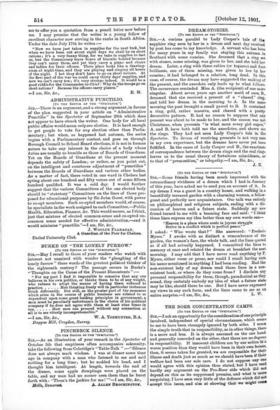ADMINISTRATIVE PUNCTILIO.
[TO THE EDITOR OF THE "SPECTATOR."]
Sra,—There is an argument, and a strong argument, in favour of the plan suggested in your article on " Administrative
Punctilio" in the Spectator of September 28th which does not appear to have struck the writer. One body for all local public affairs would mean only one election. It is hard enough
to get people to vote for any election other than Parlia- mentary ; but when, as happened last autumn, the series begins with a Parliamentary contest, and goes on through Borough Council to School Board elections, it is not in human nature to take any interest in the choice of a body whose duties are usually so humble as those of Boards of Guardians.
Yet on the Boards of Guardians at the present moment depends the safety of London ; or rather•, as you point out, on the intelligent and courteous adjustment of " punctilios " between the Boards of Guardians and various other• bodies.
As a matter of fact, there voted in one ward in Chelsea last spring about one hundred and fifty voters out of some fifteen hundred qualified. It was a cold day. I would further suggest that the various Committees of the one elected body should be " statutory " Committees on the lines of those pro- posed for educational purposes by Sir John Gorst, with power to co-opt members. Such co-opted members would, of course, be specialists in the work assigned to each Committee,—Public Health, Education, Finance. &c. This would secure, as I think, just that mixture of elected common-sense and co-opted un- common sense needed for effective administration,—and it would minimise " punctilio."—I am, Sir, &c.,
J. WOULFE FLANAGAN,
A Guardian of the Poor for Chelsea.
United University Club.














































 Previous page
Previous page